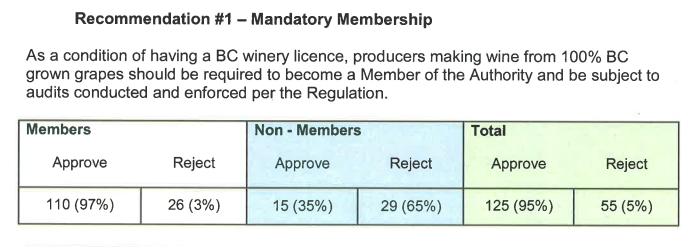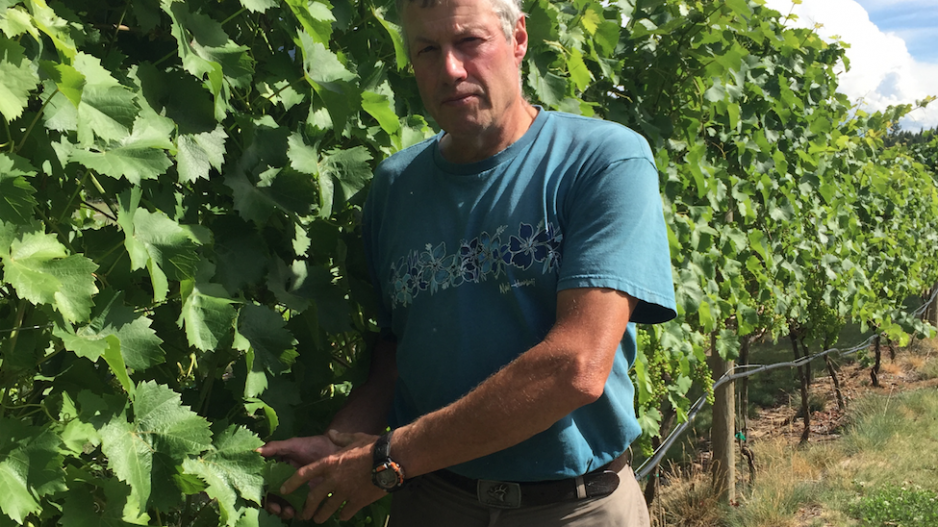(This is the first part of a three-part series on the British Columbia Wine Authority's plebiscite. Part 2: Move to sub-region names on labels could hike B.C. wine prices; Part 3: Plebiscite result restricts non-BCVQA labelling)
Agriculture Minister Norm Letnick has a battle on his hands.
Many B.C. winery owners are angry that he plans to change regulations to require all winery owners in the province to be members of the British Columbia Wine Authority (BCWA).
Letnick told Business in Vancouver that he wants to make that requirement because B.C. winery owners support the move.
The BCWA held a province-wide plebiscite between May 20 and July 1 in which it encouraged principals of its 174 member-wineries, as well as owners of the province’s 79 wineries that don’t belong to the organization, to vote on whether all wineries in B.C. should have to be members of the BCWA as a condition of getting a provincial licence to operate.
In a turnout of 78% for members and 56% for non-members, BCWA member winery owners voted overwhelmingly – more than 80% – that membership should be required.
Non-members, meanwhile, voted 66% against that motion.
“I’m a big believer in the democratic system and this has been passed in a vote,” Letnick said. “I respect that.”
Letnick is consulting staff to determine whether the legislature needs to pass a law to make the change or whether cabinet can simply tweak existing regulations.
Regardless of the process, some winemakers are angry about the looming change.
“I don’t want a bureaucrat telling me the quality of my wine,” said Xavier Bonilla, who owns Vancouver Island’s Cherry Point Estate Wines. “My customers tell me the quality of my wine.”
Bonilla, whose winery has had a licence for 25 years, told BIV that he has no intention of joining the BCWA. He also does not think it is fair for him to lose his licence if he refuses.
Many B.C. winery owners who are not members of the BCWA are small and produce about 3,500 or fewer cases annually.
Some argue that the BCWA is an inefficient bureaucracy and that they would get nothing tangible from being a member, yet would have to pay the annual $115 membership fee, a $65 audit fee and a $10 fee for each tonne of grapes they produce, with the minimum tonnage charge being $50.
Proponents of making BCWA membership mandatory say that it is important for consumer protection because the BCWA conducts audits and chemical testing of juice to ensure accurate designation and labelling of bottled wine.
Bonilla and other non-BCWA members, such as Ovino Winery owner John Koopmans, counter that the BCWA’s audits are redundant because the Canadian government already audits their operations.
All winemakers must declare where their grapes are grown in order to get an exemption from the federal excise tax, which applies to grapes grown outside Canada.
“I’ve had a [Canada Revenue Agency] guy sitting here for four days auditing our small production,” Koopmans told BIV. “I said, ‘What are you going to do at Mission Hill [Family Estate Winery], bring a small army?’”

(Image: the raw number indicates the number of winery owners voting in that category. The bracketed percentage is the voting percentage based on the volume of all B.C. wine. The plebiscite required a vote of 65% of winery owners in order to pass as well as a vote that represented winery owners who produce at least 50% of the total volume of B.C. wine)
Rhys Pender, who owns Little Farm Winery and is a member of the B.C. Wine Appellation Task Group that spearheaded the plebiscite, agreed with Koopmans that audits should not be duplicated.
But Pender supports requiring wineries to be members of the BCWA because it ensures consistency in labelling, he said.
The BCWA has an inspector in charge of screening for unauthorized terms on labels. That inspector has no authority over wineries that are not BCWA members, so those wineries effectively could put any terms that they want on their labels, Pender said.
“Everyone should be playing on the same level playing field,” he said. “So either everyone puts whatever they like on their labels or those terms are controlled and you pay a small amount into that [regulatory] body.”
Pender said this is the case in most wine regions around the world and that this requirement is an example of B.C.’s wine industry coming of age.•




